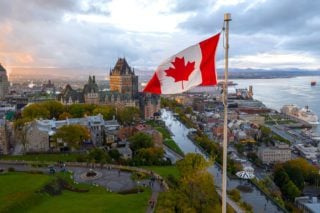 Canada is a favorite destination among expats from around the world, and with good reason. Canadians are known for being friendly and polite, and the country was recently voted the most welcoming in the world for immigrants. Some people might be put off by how cold it gets in much of Canada, but its inclusive culture, high quality of life, and upward mobility make it an attractive choice.
Canada is a favorite destination among expats from around the world, and with good reason. Canadians are known for being friendly and polite, and the country was recently voted the most welcoming in the world for immigrants. Some people might be put off by how cold it gets in much of Canada, but its inclusive culture, high quality of life, and upward mobility make it an attractive choice.
There are lots of things to think about before moving abroad, but the first thing to understand is how much it costs to live in Canada. Because the country is so large, the answer varies a lot depending on where you want to live.
Keep reading for our comparison of how the cost of living in Canada stacks up to other developed nations. Prices were sourced from Numbeo. These prices were up to date as of August 2022.
Is Canada Expensive?
The simple answer is yes—Canada has living costs that are similar to the USA. Some things, like gas, cost more in Canada. Other things, like rent, tend to be lower, especially compared to major cities like New York or San Francisco. But for the most part, living in Canada carries similar expenses to living in the United States.
Of course, the cost of living in a country as large as Canada can vary widely. First off, every province is different and has its own government and tax rates, both for income and sales tax. Much like in the United States, more popular and populated provinces tend to cost more to live in, while places that are a little more sleepy and out of the way are cheaper. Wherever you are, living in the countryside instead of a major city can save you money. If you want to live near a major city and save some money, consider the nearby suburbs. You may be able to save a lot by living in Gatineau instead of Ottawa, for example, or Laval instead of Montreal.
What Are the Most Expensive and Cheapest Places to Live in Canada?
Most Expensive Cities to Live in Canada
The major cities in Canada are the most expensive to live in, but they also have a lot of benefits. The five most expensive cities to live in Canada as of July 2022’s Mercer Cost of Living ranking are:
- Toronto, Ontario. The vast business hub of Canada recently overtook its West Coast sister, Vancouver, for the most expensive city in Canada. Toronto is also Canada’s biggest city. Expats will find that living abroad in Toronto offers neighborhood variety, fast pace, and multicultural flavor of its US equivalent, New York. But while it’s the most expensive city in Canada, it only ranks 89th in the world. New York is number 7.
- Vancouver, British Columbia. Vancouver is a port city nestled amid astounding natural beauty on Canada’s west coast. Its milder climate (similar to Seattle), stunning mountains, forests, ocean, and thriving arts scene make it a popular place to settle.
- Montreal, Quebec. Canada’s bilingual city is beloved for its sophistication, multiculturalism, and distinct Quebecois culture. One of the oldest cities in Canada, Montreal feels more like a European city. The food, too, is not to be missed. Be aware, though, that if you choose to live in Quebec, you’ll need to learn French.
- Ottawa, Ontario. Ottawa is the federal capital city of Canada and has a reputation for being a bit staid. But the Capital Region, as Canadians call Ottawa and nearby Gatineau, Quebec, is also known for vibrant museums, music festivals, and lots of nearby nature preserves.
- Calgary, Alberta. Alberta is sometimes known as the Texas of Canada because of its plains, cattle, oil reserves, and political conservatism. Set near the foot of the Canadian Rockies, the city once known as “Cowtown” is still one of Canada’s most recognizable places.
Cheapest Places to Live in Canada
As is often the case, some of the more affordable places to live are outside of the major cities. There are smaller cities, too, that are very affordable if you’re willing to be farther from the action. Every year, various outlets, including Yahoo Finance, survey the most affordable places to live in Canada. Below are five cities from the list that are either close to major cities or offer a slower pace of life in areas with a lot of natural beauty:
- Longueuil, Quebec. Montreal’s second-biggest suburb, next to Laval, Longueuil combines old-world charm with modern convenience. Living on the opposite bank of the St. Lawrence makes it easy to access Montreal for a much lower price tag. Longueuil is also home to Canada’s space agency and offers opportunities in its own right.
- Lèvis, Quebec. Similarly situated across the St. Lawrence River from a major urban center, Lèvis is home to the more industrial side of Quebec City. Yet it’s still close enough to the provincial capital’s beauty and charm for a greatly reduced cost.
- Brockville, Ontario. Brockville is a welcoming, family-oriented small city that sits on the banks of the St. Lawrence in the gorgeous Thousand Islands region. Brockville is about an hour and a half outside Ottawa and about equidistant from Toronto and Montreal.
- Weyburn, Saskatchewan. Probably the most remote city on this list, Weyburn is located over an hour from the province’s largest city, Regina. If you want to live in a peaceful, affordable place that’s still vibrant, Weyburn was voted the best place to live on the Prairies in the past few years.
- Prince George, British Columbia. Far from the coast and closer to the Yukon territory, Prince George is the largest city in the northern half of the westernmost province. The low cost of living, easy-going rural lifestyle, and rich natural surroundings are all big draws.
The Average Cost of Living in Canada
Housing Costs in Canada
Canada is the second-largest country in the world by landmass (Russia is first), and what you’ll pay for housing depends a lot on where you live.
As discussed above, Vancouver is one of the most expensive cities in Canada. But that’s partly because Vancouver is also one of the most popular destinations for expats. Monthly rent in Vancouver is comparable to metro areas like London or New York (outside of ultra-expensive Manhattan). For a one-bedroom apartment in an expensive neighborhood, you can expect to pay about USD$1,600-$1,950 per month. Outside the city center, a three-bedroom goes for $2,040-$2,500 per month. Basic utility costs will run you between USD$75-$92, with internet costing an average of USD$55-$67 per month.
Toronto, the largest city in Canada, has surpassed Vancouver in cost of living as of 2022. A one-bedroom apartment in the city center rents for about USD$1,480-$1,800 per month, while a three-bedroom home in the suburbs is about USD$2,050-$2,500 per month. Utilities cost around USD$108-$132 per month, and internet is USD$50-$60.
Other cities can be less expensive. Here are average monthly rents for one-bedroom and three-bedroom apartments in other locations popular with expats:
- Montreal: one-bedroom USD$970-$1,200; three-bedroom, $1,620-$1,975
- Ottawa: one-bedroom USD$1,180-$1,450; three-bedroom, $1,780-$2,175
- Calgary: one-bedroom USD$950-$1,180; three-bedroom, $1,700-$2,080
- Winnipeg: one-bedroom USD$750-$900, three-bedroom, $1,160-$1,425
If you prefer a more remote area or a smaller town, you’ll pay a lot less. In Saskatoon, for example, you can find a one-bedroom apartment for less than USD$1,000 per month (USD$820-$1,000).
Food and Entertainment Prices in Canada
While Canada is one of the world’s top food exporters for things like grain and seafood, the cold climate means a short growing season for fresh produce. Canada imports about two-thirds of its fruit and vegetables, and that makes them more expensive than produce in the U.S. or Europe.
Going out on the town for dinner in large cities, such as Montreal and Vancouver, will cost you. Dinner for two at a mid-range restaurant in Vancouver averages USD$80-$98. A trip to the movies is about USD$11.13-13.61 per ticket. Like housing, meals cost less in smaller cities and more remote towns.
If you prefer to cook at home, you can expect to pay USD$0.95-$1.17 for a one-pound bag of potatoes, USD$1.26-$1.54 for one pound of rice, and USD$4.47-$5.47 for one pound of chicken breast. Below are some costs of other popular grocery items:
- A dozen eggs will cost about USD$2.71-$3.31.
- One pound of apples costs USD$1.46-$1.78.
- One 0.5 liter bottle of domestic beer will cost USD$2.49-$3.05.
Transportation Costs in Canada
Aside from housing, food, and healthcare, it’s also important to consider what it will cost you to drive and get around in Canada. The majority of Canadians drive, and public transport is only viable inside urban areas.
According to Cross Border Shopping, gas in the U.S. costs about 20% – 25% less than fuel in Canada. If you tend to drive long distances or have a lengthy commute, this can make a huge difference. In comparison to European cities, the price of gas in Canada is just a little lower. As of August 2022, a gallon of gas will cost around USD$5.36-$6.56.
Healthcare Costs in Canada
Most people in the U.S. are well aware of Canada’s “free” health care system. But there’s a bit more to it than that.
Yes, Canadians have a government-funded healthcare system that covers basic healthcare. Funded by taxpayers, the definition of “basic care” varies from province to province.
The Canadian healthcare system is good – but there are a lot of myths and misconceptions about it. Most people think that Canadians don’t need to purchase health insurance at all. The truth is many citizens (and many expats) choose to purchase additional coverage for things that aren’t covered in the “basic” plan. Some also choose to come over the border to the United States in order to get quicker service. This is why many expats opt for global medical insurance.
The Cost of Living in Canada Depends on Where You Live
Just like in other large places like the United States and Western Europe, where you live in Canada is the biggest thing determining your monthly expenses. The country is so large and varied that a wide range of costs is possible.
In major cities like Montreal, Toronto, and Vancouver, living expenses are similar to major cities in the U.S. and Europe. In smaller towns and less populated provinces, you’ll pay less compared to the United States.
To figure out a budget and determine exactly what your cost of living will be, you first have to decide where in Canada you want to live. Luckily, Canada has so much to offer, from a variety of climates and natural settings to distinct cultures in different provinces.
If you’re leaving a small town for big city life, be prepared to pay for it. If you’re leaving a big city for a smaller, more remote Canadian location, you’ll likely pay much less. But remember: even the most expensive, cosmopolitan city in Canada is nowhere near the cost of living in New York!
Related:

